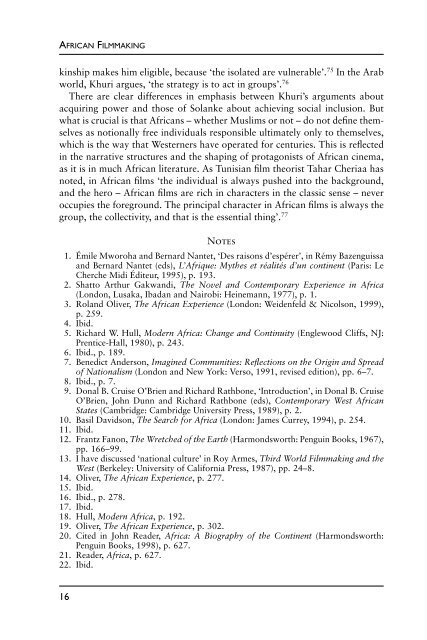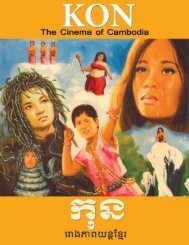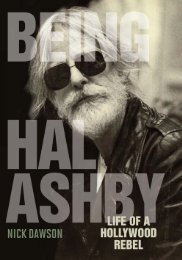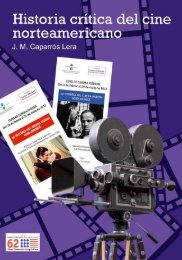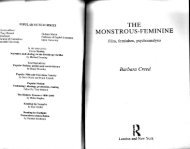THE AFRICAN EXPERIENCEfar from there being a single ‘tribal’ identity, most Africans moved in andout of multiple identities, defining themselves at one moment as subjectto this chief, at another as a member of that cult, at another moment as apart of that clan, and at yet another moment as an initiate of that professionalguild. 65This same situation persists in postcolonial society which, Achille Mbembenotes, ‘is made not of one coherent “public space”, nor is it determined by anysingle organising principle’. 66 Instead we find ‘a plurality of “spheres” andareas, each having its own separate logic yet nonetheless liable to be entangledwith other logics when operating in certain specific contexts’. 67 As a result, theindividual (what Mbembe terms ‘the postcolonial “subject” ’) ‘mobilises notjust a single “identity”, but several fluid identities which, by their very nature,must be constantly “revised” in order to achieve maximum instrumentality andefficacity as and when required’. 68In his study of Islamic society, The Multiple Identities of the Middle East,Bernard Lewis notes that ‘the primary identities are those acquired at birth’: byblood (family, clan, tribe), by place (village, neighbourhood, district, quarter,province or city) and by religion. 69 In this connection it is worth noting twoobservations made by Jolayemi Solanke about contemporary Africa as a whole.For Solanke, ‘the key concept in understanding African social organisation is thatof the corporate group. Every individual belongs to several overlapping groupswhich provide the frame of reference for his daily life’. 70 This has importantimplications for the way in which Africans see themselves as individuals. Socialcontrol within African society is based on the individual as part of a corporategroup: ‘The perception of belonging to a group – whether family, age-grade,village, clan or nation – is almost always paramount of a sense of individuality.One acts as a member of a group and is responsible to that group’. 71For those Africans who live in Islamic societies, the relationship between theindividual and the collectivity is even more complex and in many ways yetfurther removed from that which is to be found in hierarchically organised(‘pyramidal’) Western societies. Fuad I. Khuri points out that in Arab ideology,‘reality is perceived as a series of non-pyramidal structures, a matrix composedof discrete units inherently equal in value’. 72 Three ‘principles of action andorganisation’ follow from a non-pyramidal image of reality, namely, the vulnerabilityof isolation, the need to seek protection in groups, and the importanceof tactics, rather than status. 73 The individual has, therefore, a verydistinctive role in Arab culture: ‘caught between “the fear of being alone”, onthe one hand, and the drive to be “first among equals”, an imam or emir, onthe other’. 74 Success in social terms, becoming first among equals, means buildinga group around yourself, so that you will never be left alone. The only viablealternative for the individual unable to do this is to join the group for which15
AFRICAN FILMMAKINGkinship makes him eligible, because ‘the isolated are vulnerable’. 75 In the Arabworld, Khuri argues, ‘the strategy is to act in groups’. 76There are clear differences in emphasis between Khuri’s arguments aboutacquiring power and those of Solanke about achieving social inclusion. Butwhat is crucial is that Africans – whether Muslims or not – do not define themselvesas notionally free individuals responsible ultimately only to themselves,which is the way that Westerners have operated for centuries. This is reflectedin the narrative structures and the shaping of protagonists of African cinema,as it is in much African literature. As Tunisian film theorist Tahar Cheriaa hasnoted, in African films ‘the individual is always pushed into the background,and the hero – African films are rich in characters in the classic sense – neveroccupies the foreground. The principal character in African films is always thegroup, the collectivity, and that is the essential thing’. 77Notes1. Émile Mworoha and Bernard Nantet, ‘Des raisons d’espérer’, in Rémy Bazenguissaand Bernard Nantet (eds), L’Afrique: Mythes et réalités d’un continent (Paris: LeCherche Midi Éditeur, 1995), p. 193.2. Shatto Arthur Gakwandi, The Novel and Contemporary Experience in Africa(London, Lusaka, Ibadan and Nairobi: Heinemann, 1977), p. 1.3. Roland Oliver, The African Experience (London: Weidenfeld & Nicolson, 1999),p. 259.4. Ibid.5. Richard W. Hull, Modern Africa: Change and Continuity (Englewood Cliffs, NJ:Prentice-Hall, 1980), p. 243.6. Ibid., p. 189.7. Benedict Anderson, Imagined Communities: Reflections on the Origin and Spreadof Nationalism (London and New York: Verso, 1991, revised edition), pp. 6–7.8. Ibid., p. 7.9. Donal B. Cruise O’Brien and Richard Rathbone, ‘Introduction’, in Donal B. CruiseO’Brien, John Dunn and Richard Rathbone (eds), Contemporary West AfricanStates (Cambridge: Cambridge University Press, 1989), p. 2.10. Basil Davidson, The Search for Africa (London: James Currey, 1994), p. 254.11. Ibid.12. Frantz Fanon, The Wretched of the Earth (Harmondsworth: Penguin Books, 1967),pp. 166–99.13. I have discussed ‘national culture’ in Roy Armes, Third World Filmmaking and theWest (Berkeley: University of California Press, 1987), pp. 24–8.14. Oliver, The African Experience, p. 277.15. Ibid.16. Ibid., p. 278.17. Ibid.18. Hull, Modern Africa, p. 192.19. Oliver, The African Experience, p. 302.20. Cited in John Reader, Africa: A Biography of the Continent (Harmondsworth:Penguin Books, 1998), p. 627.21. Reader, Africa, p. 627.22. Ibid.16
- Page 2: AFRICAN FILMMAKING
- Page 6 and 7: CONTENTSAcknowledgementsList of Acr
- Page 8: ACKNOWLEDGEMENTSHere, as with all m
- Page 11 and 12: AFRICAN FILMMAKINGFAMU Filmov Akade
- Page 14 and 15: In memory of Lionel NgkaneFriend an
- Page 16: INTRODUCTIONThe progress of the mea
- Page 19 and 20: AFRICAN FILMMAKINGunder 11 million
- Page 21 and 22: AFRICAN FILMMAKINGAs in eastern Eur
- Page 23 and 24: AFRICAN FILMMAKINGhad to leave a ro
- Page 25 and 26: AFRICAN FILMMAKINGIslamIn addition
- Page 27 and 28: AFRICAN FILMMAKINGSomalian Nuruddin
- Page 29: AFRICAN FILMMAKINGThe contrast in t
- Page 33 and 34: AFRICAN FILMMAKING58. Troin, Maghre
- Page 36 and 37: 2. BEGINNINGSNorth Africa has given
- Page 38 and 39: BEGINNINGSthey are suffused with ra
- Page 40 and 41: BEGINNINGSthe dozen cameramen emplo
- Page 42 and 43: BEGINNINGSwith the spirit of aparth
- Page 44 and 45: BEGINNINGSintensity and calamitous
- Page 46 and 47: BEGINNINGSmilitant film was used as
- Page 48 and 49: BEGINNINGSSouth Africa. But in the
- Page 50 and 51: BEGINNINGS52. Mouny Berrah, ‘Hist
- Page 52 and 53: AFRICAN INITIATIVESfollows, is that
- Page 54 and 55: AFRICAN INITIATIVESthe OAA, set up
- Page 56 and 57: AFRICAN INITIATIVESaim of producing
- Page 58 and 59: AFRICAN INITIATIVESMoroccan system.
- Page 60 and 61: AFRICAN INITIATIVESThe number of ci
- Page 62 and 63: AFRICAN INITIATIVESRouch’s docume
- Page 64 and 65: AFRICAN INITIATIVESBathily’s Tiya
- Page 66 and 67: AFRICAN INITIATIVESThirdly, in all
- Page 68 and 69: 4. THE FRENCH CONNECTIONIt is less
- Page 70 and 71: THE FRENCH CONNECTIONattitudes, tho
- Page 72 and 73: THE FRENCH CONNECTIONwhose funding
- Page 74 and 75: THE FRENCH CONNECTIONThe African Fi
- Page 76 and 77: THE FRENCH CONNECTIONindividuality
- Page 78 and 79: THE FRENCH CONNECTIONcan also be ap
- Page 80:
PART IICONFRONTING REALITYAfrican c
- Page 83 and 84:
AFRICAN FILMMAKINGas we think’. I
- Page 85 and 86:
AFRICAN FILMMAKINGhad to be largely
- Page 87 and 88:
AFRICAN FILMMAKINGas a mere individ
- Page 89 and 90:
AFRICAN FILMMAKINGmemory? Folklore?
- Page 91 and 92:
AFRICAN FILMMAKINGdown a well and t
- Page 93 and 94:
AFRICAN FILMMAKINGabout the French
- Page 95 and 96:
AFRICAN FILMMAKINGIn Fad’jal (197
- Page 97 and 98:
AFRICAN FILMMAKINGnarrative, with v
- Page 99 and 100:
AFRICAN FILMMAKINGkillings, the mov
- Page 101 and 102:
AFRICAN FILMMAKING25. For a detaile
- Page 103 and 104:
AFRICAN FILMMAKINGissues. As Tahar
- Page 105 and 106:
AFRICAN FILMMAKINGDepardieu and the
- Page 107 and 108:
AFRICAN FILMMAKINGgirlfriend with h
- Page 109 and 110:
AFRICAN FILMMAKINGside of African c
- Page 111 and 112:
AFRICAN FILMMAKINGbecause the lead
- Page 113 and 114:
AFRICAN FILMMAKINGmen dabbling (in
- Page 115 and 116:
AFRICAN FILMMAKINGa social revoluti
- Page 117 and 118:
AFRICAN FILMMAKINGIn Burkina Faso a
- Page 119 and 120:
AFRICAN FILMMAKINGfocused and the t
- Page 122:
PART IIINEW IDENTITIESThe past cont
- Page 125 and 126:
AFRICAN FILMMAKINGsubsequent years.
- Page 127 and 128:
AFRICAN FILMMAKINGThe 1970sIn Sub-S
- Page 129 and 130:
AFRICAN FILMMAKINGfrom the police a
- Page 131 and 132:
AFRICAN FILMMAKINGlevel, and ‘to
- Page 133 and 134:
AFRICAN FILMMAKINGthis message. As
- Page 135:
AFRICAN FILMMAKINGthe simple story
- Page 139 and 140:
AFRICAN FILMMAKINGaudience’s resp
- Page 141 and 142:
AFRICAN FILMMAKINGwater in a desert
- Page 143 and 144:
AFRICAN FILMMAKINGtradition’. 12
- Page 145 and 146:
AFRICAN FILMMAKINGshifts in the win
- Page 147 and 148:
AFRICAN FILMMAKINGby her future in-
- Page 149 and 150:
AFRICAN FILMMAKINGon their brutalit
- Page 151 and 152:
AFRICAN FILMMAKINGsometimes in big
- Page 153 and 154:
AFRICAN FILMMAKINGSene Absa’s sec
- Page 156:
PART IVTHE NEW MILLENNIUMIf it’s
- Page 159 and 160:
AFRICAN FILMMAKINGThough there is c
- Page 161 and 162:
AFRICAN FILMMAKINGdiscovering only
- Page 163 and 164:
AFRICAN FILMMAKINGand summons his f
- Page 165 and 166:
AFRICAN FILMMAKINGthem in a final r
- Page 167 and 168:
AFRICAN FILMMAKINGmercy of the rest
- Page 169 and 170:
AFRICAN FILMMAKINGBekolo’s second
- Page 171 and 172:
AFRICAN FILMMAKINGThe films of the
- Page 173 and 174:
10. MAHAMAT SALEH HAROUN (CHAD)Beca
- Page 175 and 176:
AFRICAN FILMMAKINGAlmost immediatel
- Page 177 and 178:
AFRICAN FILMMAKINGFigure 10.1Mahama
- Page 179 and 180:
AFRICAN FILMMAKINGthat we are witne
- Page 181 and 182:
AFRICAN FILMMAKINGNotes1. Mahamat S
- Page 183 and 184:
AFRICAN FILMMAKINGallowing the grio
- Page 185 and 186:
AFRICAN FILMMAKINGin Sissoko’s Gu
- Page 187 and 188:
AFRICAN FILMMAKINGhis nephew Mamadi
- Page 189 and 190:
AFRICAN FILMMAKINGthe undertaker’
- Page 191 and 192:
12. RAJA AMARI (TUNISIA)The only pr
- Page 193 and 194:
AFRICAN FILMMAKINGFigure 12.1Raja A
- Page 195 and 196:
AFRICAN FILMMAKINGBut when her daug
- Page 197 and 198:
AFRICAN FILMMAKINGsocial setting in
- Page 199 and 200:
AFRICAN FILMMAKINGHe has received C
- Page 201 and 202:
AFRICAN FILMMAKINGfrom one to anoth
- Page 203 and 204:
AFRICAN FILMMAKINGFigure 13.2Faouzi
- Page 205 and 206:
AFRICAN FILMMAKINGBensaidi’s own
- Page 207 and 208:
AFRICAN FILMMAKINGa priority in its
- Page 209 and 210:
AFRICAN FILMMAKINGThe film’s open
- Page 211 and 212:
AFRICAN FILMMAKINGFigure 14.2Abderr
- Page 213 and 214:
AFRICAN FILMMAKINGSissako has said
- Page 215 and 216:
AFRICAN FILMMAKING11. Abderrahmane
- Page 217 and 218:
AFRICAN FILMMAKINGArmbrust, Walter
- Page 219 and 220:
AFRICAN FILMMAKINGCalvocoressi, Pet
- Page 221 and 222:
AFRICAN FILMMAKINGFanon, Frantz (19
- Page 223 and 224:
AFRICAN FILMMAKINGImages et Visages
- Page 225 and 226:
AFRICAN FILMMAKINGMegherbi, Abdelgh
- Page 227 and 228:
AFRICAN FILMMAKINGSalhi, Abdel-Illa
- Page 229 and 230:
AFRICAN FILMMAKINGWerbner, Richard
- Page 231 and 232:
AFRICAN FILMMAKINGAoulad Syad, Daou
- Page 233 and 234:
AFRICAN FILMMAKINGDe quelques évé
- Page 235 and 236:
AFRICAN FILMMAKINGKassari, Yasmine,
- Page 237 and 238:
AFRICAN FILMMAKINGQuand les hommes
- Page 239:
AFRICAN FILMMAKINGYeux secs, Les (N


